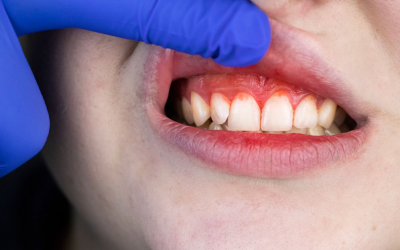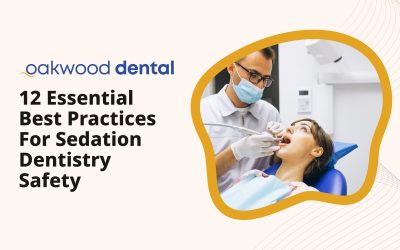Seasonal allergies can affect more than just your sinuses. They can also impact your oral health in surprising ways. At Oakwood Dental, we understand how allergies and your smile are connected. Let’s explore how seasonal allergies affect your oral health and what you can do to protect your teeth and gums all year long, keeping your smile bright and healthy despite environmental challenges.
Key Points: Seasonal Allergies and Oral Health
- Seasonal allergies can affect your mouth and teeth in multiple ways
- Common issues include dry mouth, tooth pain, and increased gum sensitivity
- Allergies may increase the risk of cavities and periodontal problems
- Proper oral care is extra important during allergy season
- Stay hydrated to help combat dry mouth and maintain saliva production
- See your dentist if you have ongoing tooth pain or gum issues during allergy flare-ups
- Allergy medications can exacerbate oral health issues, making it necessary to give your dental care extra attention.
- A comprehensive approach combining allergy management and dental care is essential
The Hidden Connection: Allergies and Your Mouth
When pollen counts are high, your mouth can have unexpected problems. Allergies can lead to gum inflammation, which can increase your risk of gingivitis and other gum issues. This inflammation isn’t just annoying; it can lead to more serious oral health problems if not treated. Here’s how allergies impact your oral health:
- Dry mouth from mouth breathing and antihistamines: Allergies often make people breathe through their mouths, reducing saliva. Many allergy medicines also cause dryness. This can create an environment where bacteria grow easily.
- More cavities due to less saliva: Saliva helps neutralize acids and wash away food. With less saliva, your teeth are more likely to get cavities because they aren’t being cleaned naturally.
- Sinus pressure causing tooth pain: The sinuses are close to the upper teeth. When allergies cause sinus pressure, it can feel like a toothache.
- Bad breath: Dry mouth and mucus in the throat from allergies can cause bad breath. This happens because bacteria build up in a dry mouth and mucus collects in the throat.
- Sensitive gums: Allergic reactions can cause inflammation in the body, including the gums. This can make your gums more sensitive and more likely to bleed when you brush or floss.
Combating Allergy-Related Oral Health Issues
Don’t let allergies hurt your smile. Taking good care of your mouth during allergy season is important for keeping your teeth and gums healthy. Here are some ways to protect your teeth and gums:
1. Stay Hydrated
Drinking lots of water helps fight dry mouth and keeps your saliva flowing. This natural defense helps wash away bacteria and food bits. Try to drink at least 8 glasses of water a day. Carrying a water bottle can help you remember to drink water often. Herbal teas without sugar can also be good, giving you both water and possible anti-inflammatory benefits.
2. Maintain Proper Oral Hygiene
Keeping your gums healthy is crucial, especially during allergy season. Brush twice a day with a soft toothbrush and fluoride toothpaste, making sure to pay extra attention to your gum line. Floss daily to remove plaque and food particles from between your teeth that a toothbrush can’t reach. If you have severe allergies, it’s important to follow up with your dentist for personalized oral care recommendations.
3. Rinse and Repeat
Gargling with salt water can help reduce bacteria in your mouth and soothe irritated tissues, making it a simple way to maintain oral health during allergy flare-ups. Mix 1/4 teaspoon of salt in a cup of warm water and gargle for 30 seconds before spitting it out. Repeat this 2-3 times a day, especially after exposure to allergens. This natural remedy can help reduce swelling and offer temporary relief from allergy symptoms affecting your mouth..
4. Use a Nasal Spray
Nasal sprays can help clear congestion, reducing the need to breathe through your mouth. This can help prevent dry mouth and the oral health issues that can result. Check with your doctor before using any nasal spray, as they can recommend the best option to alleviate your allergy symptoms while protecting your oral health.
5. Consider Allergy-Friendly Oral Care Products
Look for toothpaste and mouthwash specifically designed for dry mouth or sensitive teeth. These products often contain ingredients that help stimulate saliva production or provide extra protection against cavities. Avoid products with harsh ingredients that could irritate your mouth, especially during allergy season.
Seasonal Solutions for Every Location
Whether you’re dealing with spring pollen or fall ragweed, taking care of your teeth all year is important. Changing your oral care routine based on where you are can really help your dental health during allergy season. Here are some tips for different places to help you keep your mouth healthy no matter where you are:
Indoor Environments
Use air purifiers with HEPA filters and keep windows closed when there’s a lot of pollen outside. This can help reduce your exposure to allergens and their impact on your oral health. Regularly clean and replace air filters in your home and office to make sure the air you’re breathing is as free from allergens as possible. Consider using a humidifier to add moisture to the air, which can help with dry mouth symptoms made worse by indoor heating or cooling systems.
Outdoor Activities
If you’re spending time outside, think about wearing a mask to filter out allergens. After coming inside, rinse your mouth and gargle with salt water to remove any allergens that might have gotten in. Change your clothes and shower to remove pollen from your body and hair, reducing the risk of being exposed to allergens for a long time. When exercising outside on high pollen days, try to breathe through your nose as much as possible to filter air and reduce mouth dryness.
Workplace Wellness
Keep a dental care kit at your desk, including a toothbrush, fluoride toothpaste, and sugar-free gum, so you can take care of your mouth throughout the day, even when allergies are affecting you. If possible, use a personal air purifier at your desk to reduce exposure to allergens. Stay hydrated by keeping a water bottle nearby and sipping regularly. If your workplace allows it, consider using a small humidifier to combat dry air, which can worsen allergy symptoms and dry mouth.
When to Seek Professional Help
While you can manage many allergy-related oral health issues at home, some situations need professional help. Knowing when to see a dentist is important for keeping your mouth healthy and preventing small issues from becoming big problems. Contact Oakwood Dental if you have any of these symptoms:
- Tooth pain that doesn’t go away with allergy medicine: This could mean a more serious dental problem, like an infection, that needs immediate attention.
- Swollen or bleeding gums that last more than a few days: Long-lasting gum inflammation can be a sign of developing gum disease, which needs professional treatment.
- Severe dry mouth that doesn’t get better when you drink more water: Chronic dry mouth can lead to quick tooth decay and might need prescription treatments or changes in medication.
- Any sudden changes in your oral health during allergy season: This includes new sensitivities, changes in tooth color, or changes in how dental appliances fit.
- Difficulty swallowing or breathing: While these are more general allergy symptoms, they can also affect your oral health and overall well-being, and need immediate medical attention.
- Bad breath that doesn’t go away with good oral hygiene: This could be a sign of underlying dental issues or severe dry mouth that needs professional evaluation.
Conclusion: A Year-Round Approach to Oral Health
Seasonal allergies may come and go, but taking care of your oral health should be constant. By understanding how allergies affect your mouth and using these strategies, you can keep a healthy smile all year. Remember, regular check-ups at Oakwood Dental are an important part of your overall health routine, especially when dealing with seasonal allergies. These visits allow for professional cleaning, early detection of potential issues, and personalized advice on managing your oral health during allergy seasons.
Don’t let allergies harm your smile or oral health. A proactive approach combining allergy management, good oral hygiene, and professional dental care is key to maintaining a healthy, beautiful smile year-round. Contact Oakwood Dental today to schedule your next appointment and ensure your oral health stays in top shape, no matter the season. Our team is ready to provide you with personalized care and guidance to handle the challenges of seasonal allergies and maintain optimal dental health.

 718-979-2121
718-979-2121









